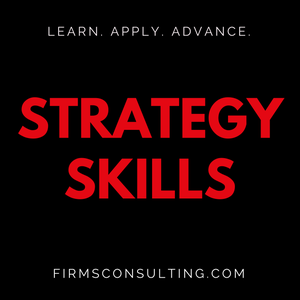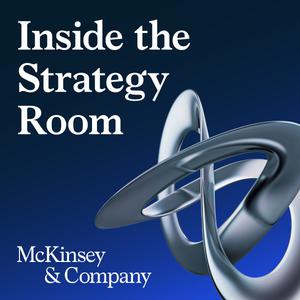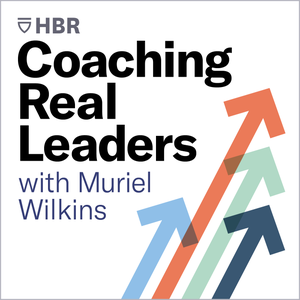
HBR On Strategy
Ian Fox
Business strategy isn’t a plan, it’s a framework for success. Whether you’re building, innovating, or executing, HBR On Strategy is your destination for insights and inspiration from the world’s top experts on business strategy and innovation. Every Wednesday, the editors at the Harvard Business Review hand-picked case studies and conversations from across HBR podcasts, videos, articles, and beyond to unlock new ways of doing business.
- 28 minutes 35 secondsLessons from Amazon’s Early Growth Strategy<![CDATA[
So much has been written about Amazon’s outsized growth. But Harvard Business School professor Sunil Gupta says it’s the company’s unusual approach to strategy that has captured his scholarly attention. Gupta has spent years studying Amazon’s strategy and its founder and former CEO Jeff Bezos.
In this episode, Gupta shares how Amazon upended traditional corporate strategy by diversifying into multiple products serving many end users, instead of having a narrow focus.
He argues that some of Amazon’s simplest business strategies — like their obsession with customers and insistence on long-term thinking — are approaches that companies, big and small, can emulate.
Key episode topics include: strategy, innovation, leadership, scaling, Jeff Bezos, long-term thinking, customer focus.
HBR On Strategy curates the best case studies and conversations with the world’s top business and management experts, to help you unlock new ways of doing business. New episodes every week.
· Listen to the full HBR IdeaCast episode: How Jeff Bezos Built One of the World’s Most Valuable Companies (2020)
· Find more episodes of HBR IdeaCast
· Discover 100 years of Harvard Business Review articles, case studies, podcasts, and more at HBR.org
]]>22 April 2024, 10:10 am - 47 minutes 39 secondsDisruptive Innovation in the Era of Big Tech<![CDATA[
In 1995, the late and legendary Harvard Business School professor Clayton Christensen introduced his theory of “disruptive innovation” right here in the pages of the Harvard Business Review. The idea inspired a generation of entrepreneurs and businesses, ranging from small start-ups to global corporations.
Three decades later, debates have emerged around how the theory should be applied — especially within technology start-ups that have driven so much economic growth since 2000.
In this episode, Harvard Business Review editor Amy Bernstein and a panel of expert scholars discuss the legacy of disruptive innovation, and how the common perception of disruption has drifted away from its original meaning.
Expert guests include:
· Harvard Business School senior lecturer and director of the Forum for Growth and Innovation Derek van Bever
· Columbia Business School professor Rita McGrath
· Harvard Business School professor Felix Oberholzer-Gee
Key episode topics include: strategy, competitive strategy, business history, disruptive innovation, Clay Christensen, innovator’s dilemma.
HBR On Strategy curates the best case studies and conversations with the world’s top business and management experts, to help you unlock new ways of doing business. New episodes every week.
· Listen to the full HBR IdeaCast episode: 4 Business Ideas That Changed the World: Disruptive Innovation (2022)
· Find more episodes of HBR IdeaCast
· Discover 100 years of Harvard Business Review articles, case studies, podcasts, and more at HBR.org
]]>17 April 2024, 10:05 am - 28 minutes 22 secondsMerging Competitors: U.S. Airways and American Airlines<![CDATA[
In February 2013, U.S. Airways announced that it would merge with American Airlines to create the world’s largest airline. During the acquisition, then-CEO Doug Parker and his board had transformative decisions to make.
How should two large corporations merge their operations? Which members of each company’s C-suites should stay? How fast should they move on these changes? Parker knew that these strategic decisions would send important signals to employees, customers, and competitors.
In this episode, Harvard Business School senior lecturer David Fubini breaks down the strategy underlying this historic airline industry merger. He explains how Parker approached each of these strategic decisions — especially in areas, like culture and operations, where American and U.S. Airways had huge differences.
Key episode topics include: strategy, corporate governance, mergers and acquisitions, operations strategy, aerospace sector, airlines, leadership.
HBR On Strategy curates the best case studies and conversations with the world’s top business and management experts, to help you unlock new ways of doing business. New episodes every week.
· Listen to the original HBR Cold Call episode: How to Lead through a Merger: U.S. Airways and American Airlines (2021)
· Find more episodes of Cold Call
· Discover 100 years of Harvard Business Review articles, case studies, podcasts, and more at HBR.org
]]>10 April 2024, 10:05 am - 15 minutes 56 secondsThe Key to Consistent Growth Is Having the Right Incentives<![CDATA[
Is your growth strategy working consistently?
Strategy expert Ken Favaro says creating and sustaining growth isn’t rocket science. However, you do have to understand the difference between “organic” growth and “inorganic” alternatives, which come through a merger or acquisition.
Favaro is the chief strategy officer at BERA Brand Management. Formerly he was a senior partner at Booz & Company—now part of PricewaterhouseCoopers (PwC).
In this episode, he argues that it’s important to focus on creating incentives for organic growth within your organization. He also explains why you should avoid typecasting your business units as “cash cows” or “growth engines” if you want them to achieve ongoing growth.
Key episode topics include: strategy, operations and supply chain management, growth strategy.
HBR On Strategy curates the best case studies and conversations with the world’s top business and management experts, to help you unlock new ways of doing business. New episodes every week.
· Listen to the original HBR IdeaCast episode: Growth Isn’t Rocket Science (2012)
· Find more episodes of HBR IdeaCast
· Discover 100 years of Harvard Business Review articles, case studies, podcasts, and more at HBR.org
]]>3 April 2024, 9:55 am - 25 minutes 56 secondsThe Key to Preserving a Long-Term Competitive Advantage<![CDATA[
For more than a century, the pharmaceutical company Roche has been headquartered in Basel, Switzerland. It’s one of more than a dozen pharmaceutical companies that have long been based there.
Howard Yu, Lego Professor of Management and Innovation at IMD Business School in Switzerland, discusses how this industrial cluster is a unique example of enduring competitive advantage. He explains how these companies offer a counter-narrative to the pessimistic view that you can’t stay ahead of the competition for long.
In this episode, you'll learn how these historic companies began as makers of chemical dyes and later evolved into microbiology. You’ll also learn how to repackage your company’s existing knowledge to pioneer new products and services. And you’ll learn why persistence and experimentation over the long term are prerequisites for innovation.
Key episode topics include: strategy, innovation, competitive strategy, pharmaceutical industry, competitive strategy.
HBR On Strategy curates the best case studies and conversations with the world’s top business and management experts, to help you unlock new ways of doing business. New episodes every week.
· Listen to the full HBR IdeaCast episode: How Some Companies Beat the Competition… For Centuries (2018)
· Find more episodes of HBR IdeaCast
· Discover 100 years of Harvard Business Review articles, case studies, podcasts, and more at HBR.org
]]>27 March 2024, 10:05 am - 26 minutes 57 secondsWhen Scaling Your Start-Up, Don’t Lose What Makes It Special<![CDATA[
So, you’ve successfully scaled your start-up and you’re growing into a mature company. What, if anything, should you retain from those early days?
Harvard Business School professor Ranjay Gulati says the most successful organizations have one thing in common: a soul. “Soul” goes beyond culture, purpose, or even the founder. It’s about having three things: strategic business intent, a strong connection to customers, and a stellar employee experience. Gulati argues that if you don’t preserve these elements as you scale, you’ll lose what makes your company special.
In this episode, he explains how to define the specific problem your company solves, with plenty of real-world examples from Netflix, Apple, and Warby Parker. You’ll also learn how to bring the voice of customers into your organization and ensure that your employees feel connected to them.
Key episode topics include: strategy, entrepreneurship, organizational culture, start-up, scaling.
HBR On Strategy curates the best case studies and conversations with the world’s top business and management experts, to help you unlock new ways of doing business. New episodes every week.
· Listen to the full HBR IdeaCast episode: Finding (and Keeping) Your Company’s Soul (2019)
· Find more episodes of HBR IdeaCast
· Discover 100 years of Harvard Business Review articles, case studies, podcasts, and more at HBR.org
]]>20 March 2024, 10:10 am - 36 minutes 34 secondsHow to Fail Right<![CDATA[
We all know Silicon Valley’s mantra: fail fast, fail often. But when is it OK to fail in the real world?
Harvard Business School professor Amy Edmondson says it depends on how and why you fail. She’s an expert on psychological safety and the author of the book, Right Kind of Wrong: The Science of Failing Well.
In this episode, she explains the difference between good and bad types of failures. One has to do with experimentation, while the other is rooted in inattention or lack of training. Edmondson also explores the downsides of not experimenting enough because your team fears failure.
Key episode topics include: strategy, psychology, business failures, psychological safety, experimentation.
HBR On Strategy curates the best case studies and conversations with the world’s top business and management experts, to help you unlock new ways of doing business. New episodes every week.
· Watch the original HBR New World of Work episode: It's OK to Fail, but You Have to Do It Right (2023)
· Find more episodes of the New World of Work series on YouTube
· Discover 100 years of Harvard Business Review articles, case studies, podcasts, and more at HBR.org
]]>13 March 2024, 10:10 am - 13 minutes 57 secondsHow 8 Successful CEOs Allocated Capital to Build Durable Businesses<![CDATA[
Think of CEOs who have made strong rates of return for investors and built durable businesses. What strategies do you associate with their success?
Investor and author William Thorndike studied eight CEOs who outperformed the market and their peers. The group included big names, like Warren Buffet and Katharine Graham, but also other leaders who are virtually unknown today. One example is Henry Singleton, an MIT-educated electrical engineer who led Teledyne Technologies from 1960 to 1986.
Thorndike noticed that these eight iconoclastic leaders all took a similar approach to capital allocation. They focused on investing their companies’ profits to repurchase their own stock when prices were optimal. But they generally avoided very large acquisitions, accruing debt, and paying dividends.
In this episode, you’ll learn how effective capital allocation strategies, like the ones used by these leaders, can generate wealth for shareholders.
Thorndike is the author of The Outsiders: Eight Unconventional CEOs and Their Radically Rational Blueprint for Success.
Key episode topics include: strategy, strategic planning, entrepreneurship, operations and supply chain management, leadership, capital allocation, debt, dividends, stock buybacks, acquisitions.
HBR On Strategy curates the best case studies and conversations with the world’s top business and management experts, to help you unlock new ways of doing business. New episodes every week.
· Listen to the full HBR IdeaCast episode: How Unusual CEOs Drive Value (2014)
· Find more episodes of HBR IdeaCast
· Discover 100 years of Harvard Business Review articles, case studies, podcasts, and more at HBR.org
]]>6 March 2024, 11:10 am - 30 minutes 1 secondHow Local Businesses Can Compete with Larger Rivals<![CDATA[
In 2020, Kwame Spearman left his consulting job in New York City to take over an iconic independent bookstore, the Tattered Cover Book Store in Denver, Colorado—his hometown.
Spearman saw an opportunity to reinvent the local business to build a community space after the pandemic. But to keep the store successful, he had figure out how to compete with online retailers and big box stores, amid technological change and shifting business models.
In this episode, Harvard Business School associate professor Ryan Raffaelli is joined by Spearman to discuss his case, “Kwame Spearman at Tattered Cover: Reinventing Brick-and-Mortar Retail.” He and Spearman explain how to set sustainable wages for employees and why community engagement is a key part of the store’s strategy for growth.
Key episode topics include: strategy, leadership, marketing, innovation, retail and consumer goods, books, wages, community engagement.
HBR On Strategy curates the best case studies and conversations with the world’s top business and management experts, to help you unlock new ways of doing business. New episodes every week.
· Listen to the original HBR Cold Call episode: Reinventing an Iconic Independent Bookstore (2022)
· Find more episodes of Cold Call
· Discover 100 years of Harvard Business Review articles, case studies, podcasts, and more at HBR.org
]]>28 February 2024, 11:10 am - 13 minutes 41 secondsHow to Build — and Maintain — Relationships with Your Shareholders<![CDATA[
Does your company have a strategy for working with investors?
Whether your company is big or small, IBM’s former CEO Sam Palmisano says it’s essential to build relationships with your shareholders before there’s a specific problem to address.
In this episode, you’ll learn how to communicate with your investors to meet their needs — without needing to change your strategy. When Palmisano was leading IBM, he offered investors detailed multi-year projections of revenue growth, rather than quarterly outlooks. This approach helped to keep the company’s focus on the long term. As he describes, “We needed to give [investors] something that worked for us and our management system and our strategy, but also was simpler and clearer so they could decide what investments they would like to make.”
You’ll also learn how Palmisano approached his role as CEO in shareholder meetings in order to send the right message to both shareholders and employees.
Key episode topics include: strategy, leadership, growth, growth strategy, economics, investors, Wall Street, shareholders, IBM.
HBR On Strategy curates the best case studies and conversations with the world’s top business and management experts, to help you unlock new ways of doing business. New episodes every week.
· Listen to the full HBR IdeaCast episode: How to Manage Wall Street (2014)
· Find more episodes of HBR IdeaCast
· Discover 100 years of Harvard Business Review articles, case studies, podcasts, and more at HBR.org
]]>21 February 2024, 11:10 am - 26 minutesShifting Your Focus from Short-Term Efficiency to Long-Term Resilience<![CDATA[
Efficiency is usually something businesses strive for, but is it possible to be too efficient?
Roger Martin is professor emeritus at the Rotman School of Management at the University of Toronto. He warns that an obsession with eliminating inefficiencies in U.S. companies has come with social and economic costs. He sees those downsides in everything from staffing to wages and even corporate debt levels. But he argues that it’s not too late for businesses to change their priorities.
In this episode, Martin helps leaders understand how to shift their thinking to connect excess resources in the shorter term with a positive outcome: long-term resilience. Martin also explains why it’s important to avoid the strategy trap of setting and meeting singular goals.
Key episode topics include: strategy, business and society, operations and supply chain management, efficiency, corporate debt, wages, staffing, inequality, goals.
HBR On Strategy curates the best case studies and conversations with the world’s top business and management experts, to help you unlock new ways of doing business. New episodes every week.
· Listen to the full HBR IdeaCast episode: When Efficiency Goes Too Far (2020)
· Find more episodes of HBR IdeaCast
· Discover 100 years of Harvard Business Review articles, case studies, podcasts, and more at HBR.org
]]>14 February 2024, 11:05 am - More Episodes? Get the App
Your feedback is valuable to us. Should you encounter any bugs, glitches, lack of functionality or other problems, please email us on [email protected] or join Moon.FM Telegram Group where you can talk directly to the dev team who are happy to answer any queries.
 The Strategy Skills Podcast: Strategy | Leadership | Critical Thinking | Problem-Solving
The Strategy Skills Podcast: Strategy | Leadership | Critical Thinking | Problem-Solving
 Cold Call
Cold Call
 Inside the Strategy Room
Inside the Strategy Room
 HBR IdeaCast
HBR IdeaCast
 Coaching Real Leaders
Coaching Real Leaders
 HBR On Leadership
HBR On Leadership